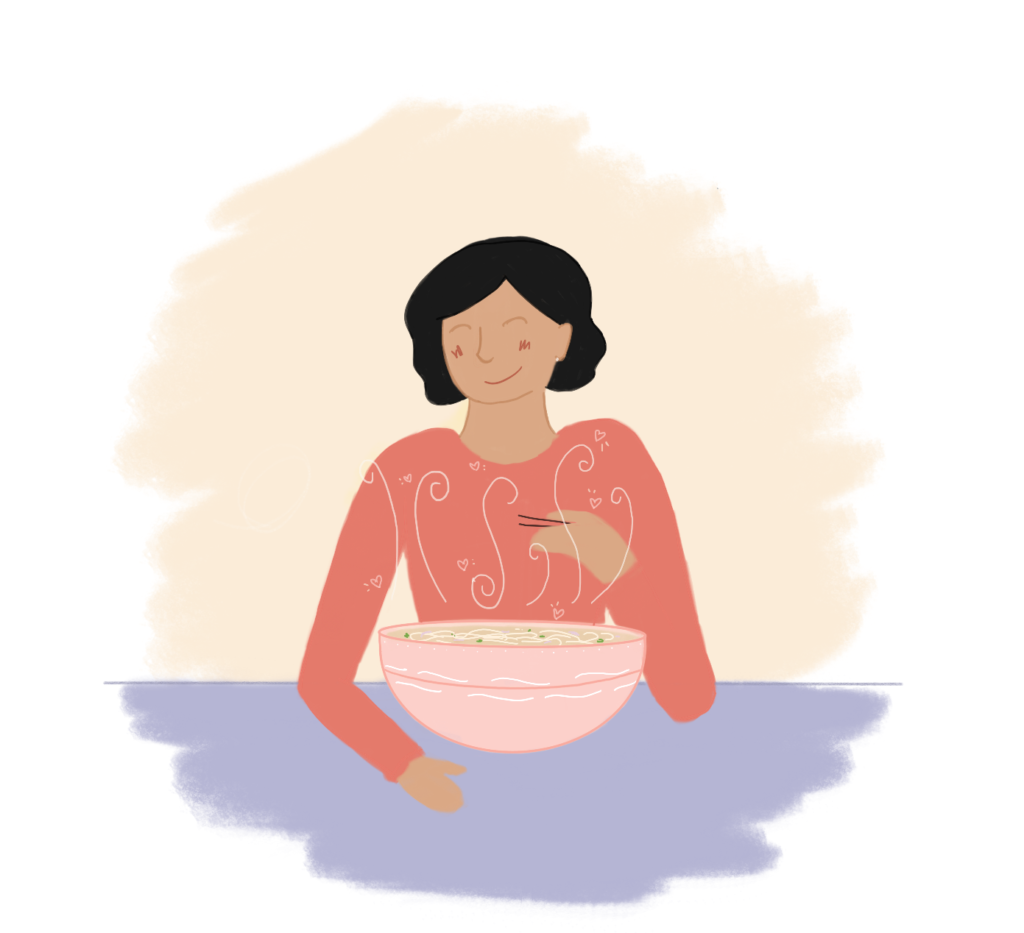
Visual Editor/Hayley Powers
In our world, where food means nothing and everything, and where you can eat basically anything, effortlessly, food can lack tenor. But the process — both how we make our food and how we eat it, too — matters. The ingredient-buying, the recipe-finding and the hours wrestled free from the spindly hands of our schedules make the difference. To be on your feet, sweating over a pot of boiling rice with peas and carrots and aji and pollo desmenuzado and trying to recreate her arroz con pollo, your favorite childhood dish, all to feel the warmth of your abuela’s hand on your shoulder in the first bite, because she is nowhere else now. Nowhere but here.
I fell in love the summer before my senior year of high school. I kept baking things for a friend out of boredom. I brought oatmeal coconut cookies one day in June. A week later, cinnamon rolls. Then matcha brownies in July, just for kicks. I would usually start baking around four in the afternoon. The baked goods would be out of the oven by seven and I’d be over at her house 15 minutes later. I’d spend hours parked in her driveway. She would lean into my car window and the “Oh, it’s this cool recipe I found on Pinterest” cookies would grow cold as we talked about every topic under the moon. I’d leave 20 minutes after my parents called with the tragic news that dinner was almost ready and they were waiting for me. She would slump forward, long hair brushing my shoulder and then fully slide out until she was standing again. She’d look around her driveway and I would call out one more question for her to answer so I would have some fact about her to turn over on the drive home. We’d end up distracted again, until one of us remembered I had to go home. I would hand over the white box full of baked goods and she would peer in and smile. I’d back out of her driveway without rolling up my window and she would wait by the front door to wave goodbye once I was turning onto her street. Halfway through dinner, my phone would light up and there was her name — usually a picture, too. “Half of them are already gone. You’re ruining me.”
“I thought you didn’t like coconut,” I said.
“Yeah well you’re just that good I guess,” she responded.
Nothing came of it, really. I mean, all I did was bake for her. Nothing came of it — except I stopped baking oatmeal coconut cookies. They’re just hers now.
Every cup of flour and every tablespoon of coconut flakes feels hollow. A sacrilege to the tender, wistful evenings we spent in each other’s company. Just as I can feel my grandmother in the arroz con pollo I make, only longing haunts these cookies. And what would be the point of making them again, when they were at the pinnacle of success the first time I made them? I have loved coconut my whole life. I can’t fall in love with it all over again.
When it comes to sharing food, love is a ritual that takes practice. As kids, my brother and I were not competitive Easter egg hunters, because we had an agreement. Once all the candy had been collected, we would lay it out on the dining table, split every type of candy evenly and then barter. My brother despised jelly beans; I was not a fan of Maltesers. As we grew older, that need for equally split food persisted. Neither of us was willing to be generous, so we either shared things fifty-fifty or not at all. It took years for us to finally relent — years of easily sharing food with friends, cousins, classmates and years of life too. And I know it took an act of kindness. One of us, though I don’t remember who, told the other to take as much as they liked. I love you. I am tired of fighting, it said. The other sibling — whichever one of us it was — laid down their metaphoric sword, and we’ve since known peace.
That ritual of love has led to the two best meals I’ve ever had. The first was six months ago, and it was barely a meal: I brought cupcakes for my therapist — a decision I was unsure about until the moment I gave them to her. She saw them, one with elegant swirls of icing, one drowning in sprinkles, one dyed blue and one with cookie crumbs on top, and her face lit up. She rushed over to the office kitchen and pulled out two colorful, mismatched ceramic plates and a “How does that make you feel?” mug. I was directed to an entire wall of tea. I chose a raspberry pomegranate tea bag. Back in her office, she set down everything she’d brought.
“Will you split one with me?” she asked, grinning.
“I’d love to.” So this is what it feels like, I thought, to heal. She picked the blue one.
She was very careful about cutting two perfectly equal pieces, explaining that she had always needed to split her food equally when she shared it with someone. As we ate together — as she raved about how delicious it was, as we licked icing off our fingers and squished the crumbs under our thumbs, as we unabashedly let each other see how much we’d enjoyed it — I remembered the second-best meal I’ve ever had.
I was 10. My brother was having a birthday party and I was not invited. Instead, I spent the day at the beach with my best friend Pauline and her mother.
Pauline and I were an unshakeable creative force when we played in our rooms, but with the sea and the sand available, we became something else. Maybe goddesses or queens. Not mermaids, that I know for sure.
At the end of the day, as the sun set, my best friend and I sat on our beach chairs and shared a pizza her mother had gotten for us. It was warm and made more delicious by how tired we were after our day of playing. The sky matched the tomato sauce around our lips. The dusting of flour on our fingers was a twin to the sand we had played with just minutes before. As we leaned into each other, brown wet hair getting all tangled up, we dreamt up our next adventure, reenergized by the warm meal we’d shared and colors that grazed through the sky. I don’t remember, now, exactly what we played. I don’t remember whether we pretended to be enemies or allies as we sprinted into the sea. But I remember the crunch of the crust and the warmth where our legs touched, where we supported the pizza between us. We ate our fill. We ate it all.
There are a dozen recipe books in my parents’ house, but the only one I care for is a very old Mickey Mouse notebook that’s fat with all the papers that have been haphazardly shoved between its pages. Brownie batter stains, my mother’s round handwriting, family secrets, a hardened lump of icing sugar and my childhood cover its pages. When I leaf through it, I don’t know where to stop or where to look. I have started my own recipe notebook and am trying to decide what I want to transcribe first.
Every Colombian recipe I know of has to be adjusted when prepared in the U.S. Bogotá sits 8,660 feet above sea level; the world is a lot drier there. My dad insists that there must be something different, too about the water, the butter, the flour or the salt, because nothing tastes the same.
I’m worried that no matter what I transcribe, I won’t dare to try preparing those recipes. They will be meticulously written out, but without my mother’s guiding hand or my grandmother’s stern remarks, I will fail. I learned to love my family recipes because of the people who made them for me, with me. Arroz con pollo did not become my favorite dish the first time I tried it. It became my favorite dish the second time — when I walked into my abuela’s kitchen and found that she had made it again because she remembered that I had enjoyed it. And the copy of that recipe in my parent’s house serves 12, but I am just one. These are foods dense with history and hope. These are recipes older than me, older than my parents and sometimes older than my grandparents. If I make these recipes by myself, for myself, there is no guarantee that they will be imbued with the care, patience and love that my family offered me. But then maybe I can imbue something new, something tender, something wistful.
I end up starting with a recipe I know I can make well on my own. A recipe to serve as the opening prayer — a blessing for every meal to follow and every memory I’ll try to recreate. A recipe that is all love. The recipe that made the girl I loved fall in love with something too: coconut oatmeal cookies.
Isabel Cuellar (25C) is from Miami, Florida and Bogotá, Colombia.
Isabel Cuellar (she/they) (25C) is from both Miami, Florida and Bogotá, Colombia and double majoring in creative writing and business. They enjoy reading and writing about the latinx diaspora, as well as obsessing over Taylor Swift. If you’re looking for them on campus, you’re most likely to find them reading The Secret History in Candler Library’s Reading Room.



